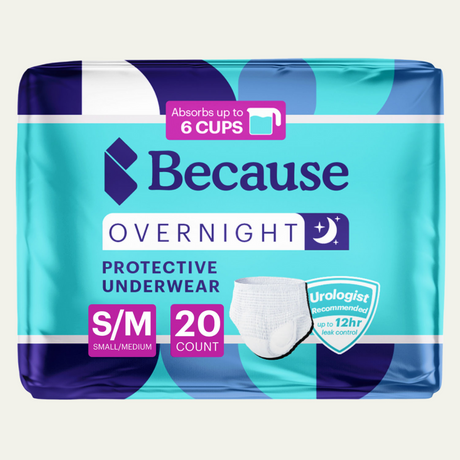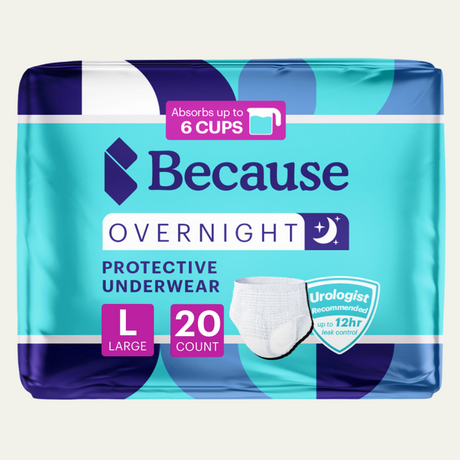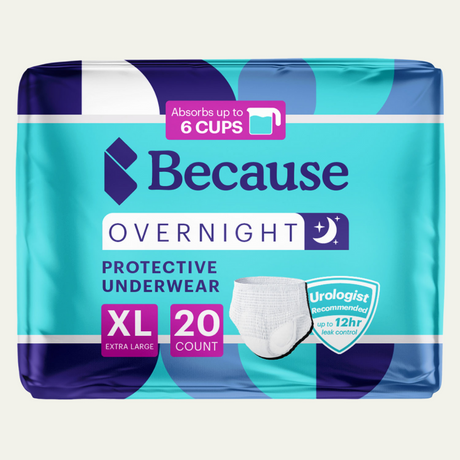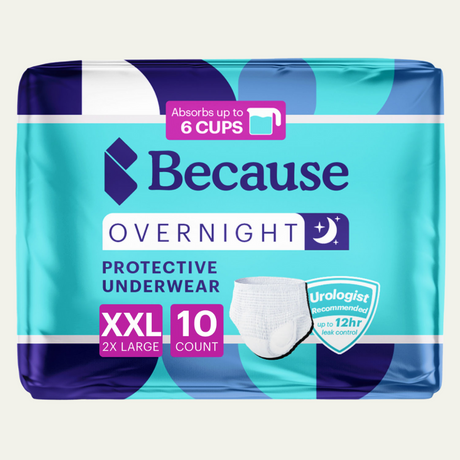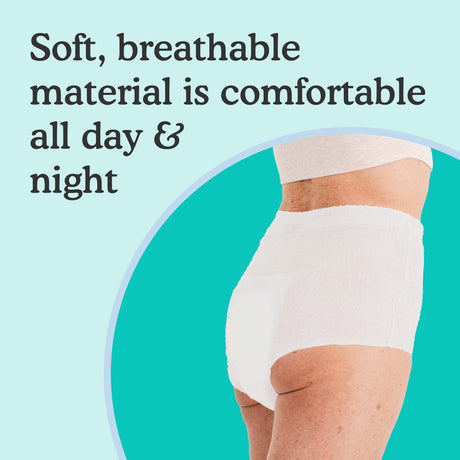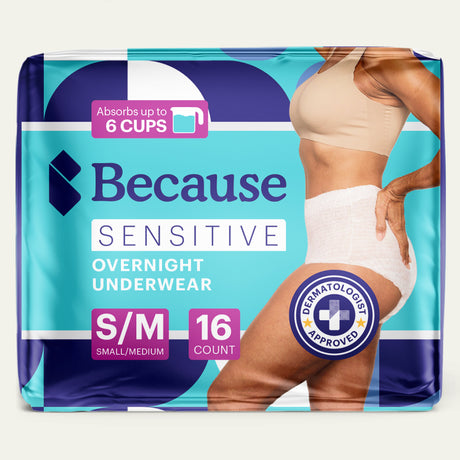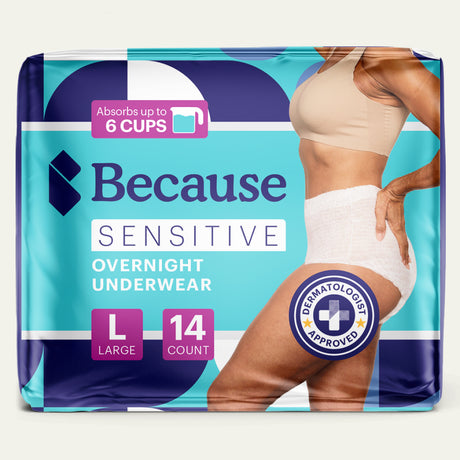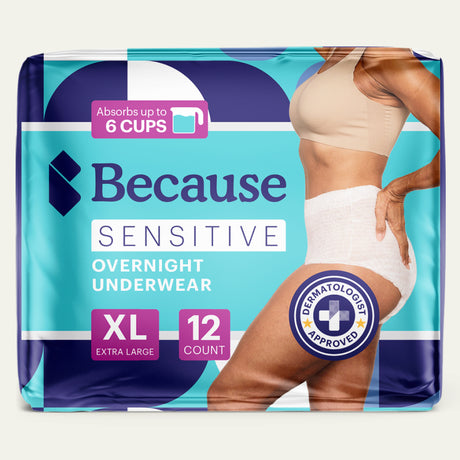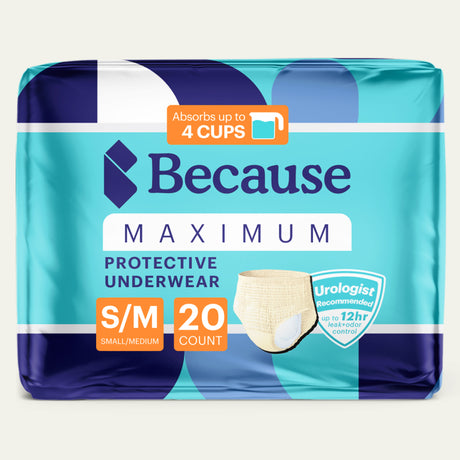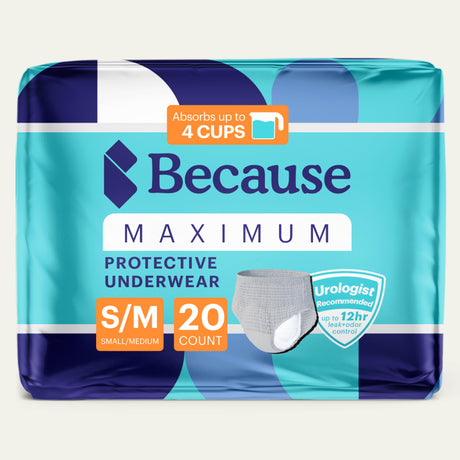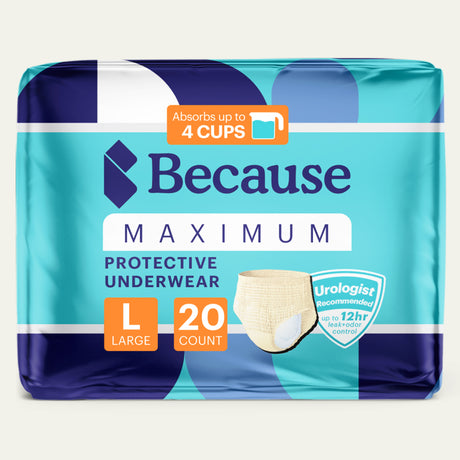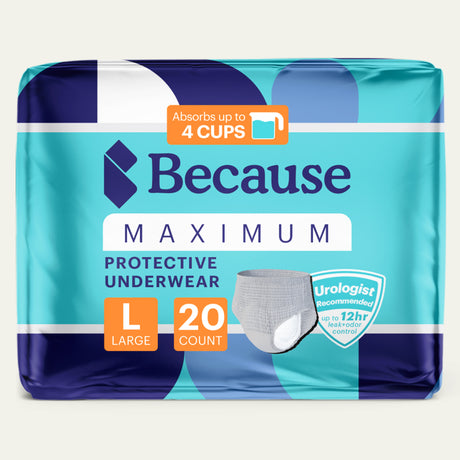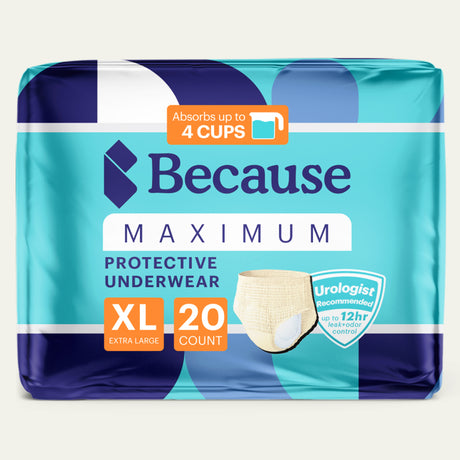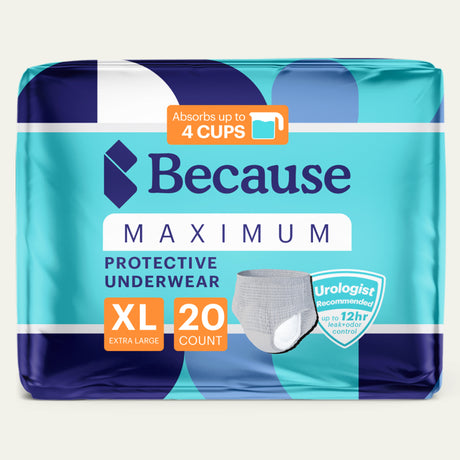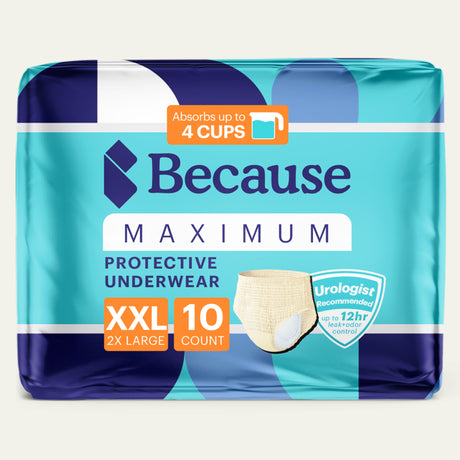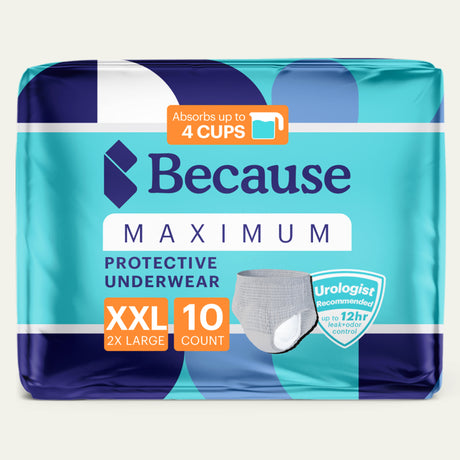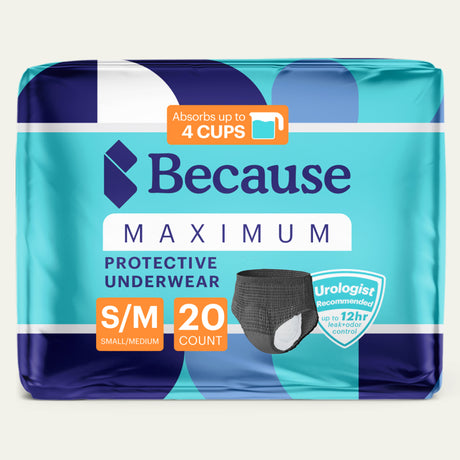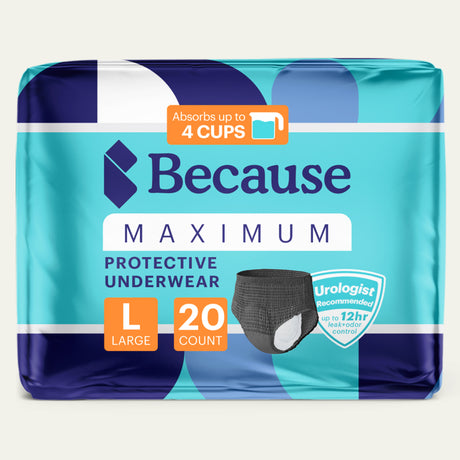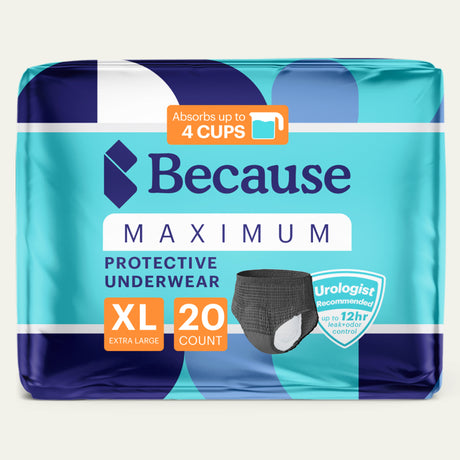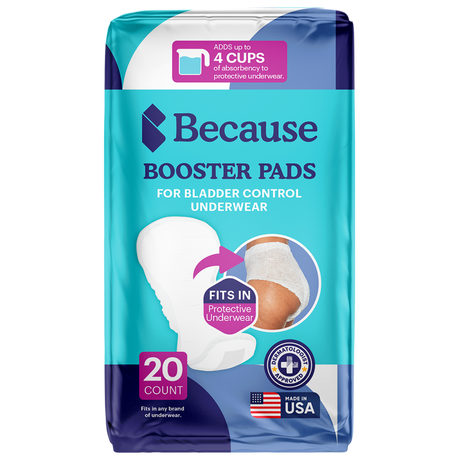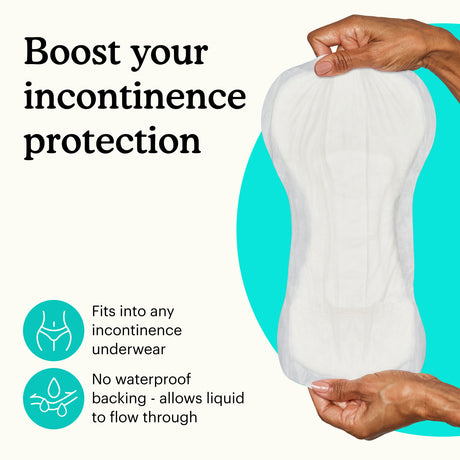Many older adults live with bladder leaks, but for older adults who also have Alzheimer's disease or dementia, there are a few special considerations for how to manage urinary incontinence. If you’re caring for an older adult who has both dementia and incontinence, here’s what you need to know.

Is Incontinence Common with Dementia?
Incontinence is fairly common in the overall population: in the United States, over half of adults over sixty-five have mild incontinence and a quarter of older adults experience moderate to severe incontinence, with constant bladder leaks.
That said, incontinence is even more common in people with dementia, as 60-70% of those with dementia will develop incontinence. However, not all incontinence in people with dementia or Alzheimer's disease is caused by this medical condition. If incontinence is caused by other factors, treating those issues could resolve the bladder leaks as well.
Why Do People with Dementia Become Incontinent?
People with dementia can become incontinent for all the same reasons others become incontinent. Some common types of incontinence include overactive bladder, stress incontinence (a common problem in women e.g. from muscle damage during childbirth), incontinence caused by a blockage in the urinary tract, and nerve damage that makes it hard to tell when you need to use the bathroom.
In addition to these types of incontinence, people with dementia are likely to have functional incontinence. Functional incontinence refers to when the urinary system is healthy, but the person can’t get to the restroom in time or can’t use the toilet on their own.

Signs of Dementia Incontinence
People who have incontinence caused by their dementia might:
- Have accidents that they try to hide or forget about before cleaning up.
- Try to use the restroom but can’t find the toilet before they have an accident.
- Try to use the restroom but forget how to use the toilet.
- Not recognize that they need to use the restroom or be slow to react to urges.
Remember: dementia isn’t always the main cause of incontinence. If a person you care for has urinary or fecal incontinence, it’s good to keep track of what kind of leaks they have (are there frequent dribbles or larger spills? Is there pain or not?) and talk to a doctor, so they can help determine whether the underlying cause of incontinence is treatable.
Daily Management of Dementia and Incontinence
Regardless of the cause, it’s important for people with incontinence to keep clean and dry for their own health and comfort. If you care for someone with dementia and incontinence, you can help keep them comfortable with well-fitting, absorbent pads and underwear and with gentle skin care.
Bladder Protection Products
Absorbent underwear can catch leaks and keep people clean and dry even when they can’t get to the bathroom in time. Another good option, if you don’t need the all-round protection of absorbent underwear, is to add pads and guards to normal underwear. Choosing the right kind of protection for the type of urinary incontinence you are dealing with can help you and the people you care for feel more confident about going out and doing normal activities without worrying about leaks.
Hygiene and Odor Control
To control incontinence odors, it’s important to keep skin and clothing clean and dry. Use well-fitted underwear with good absorbency to ensure that even when a bladder leak occurs, it doesn’t cause noticeable odors. High-quality absorbent underwear also keeps skin dry, which helps prevent infections.

Other odor control tips include:
- Keeping disposable bags on hand to wrap up and dispose of soiled pads and underwear.
- Keeping gentle skin cleansers on hand to clean up after bigger leaks.
- Staying hydrated to prevent UTIs and reduce urine odors.
Skin Care
Older people typically have more delicate skin, and bathing every day can make it brittle and dry. In addition, skin can be easily irritated or develop sores by staying wet for too long or due to chafing from ill-fitting underwear.
To stay clean, it’s important to use absorbent underwear and change it when it no longer keeps skin dry. Gentle cleaning products - for example, cleaning sprays and personal wipes- can help people with incontinence keep fresh between baths, and protective skin cream can guard against excess moisture or chafing.
Coping with Dementia and Incontinence at Night
People living with Alzheimer's or dementia might struggle to make it to the toilet at night, leading to more accidents and sleep disturbances than those without dementia. Preparing for accidents ahead of time can make them less of a disruption. Some tools to help deal with incontinence at night include:
- Overnight Bladder Protection: Overnight underwear is one of the easiest ways to keep clean and dry at night. Overnight underwear is more absorbent than daily underwear, so you don’t have to get up in the middle of the night to change it.
- Bed Protection: Sometimes accidents are inevitable. For peace of mind, try using a bed protector to help absorb leaks and keep both the sleeper and the mattress dry.
- Keeping a Portable Toilet Chair Next to the Bed: People with dementia might not be able to find the bathroom when they wake up in the middle of the night. You can help them avoid accidents by putting a portable toilet beside the bed. This can also help prevent falls by reducing the distance people have to walk in the dark to get to the bathroom.

How to Help People who have Dementia with their Incontinence
Be Understanding
People with incontinence often feel embarrassment or shame about their symptoms. This might lead them to hide their accidents or not ask for help when they need it. Try to talk about bladder leaks matter-of-factly; reassure the person you’re caring for that it’s not their fault, stay focused on managing the symptoms, and ask what would make them more comfortable.
Monitor What and When the Person is Drinking
Some simple changes to their drinking schedule can help keep a person with dementia and incontinence healthy without causing extra accidents:
- Limit caffeine, alcohol, and carbonated beverages: These can irritate the bowels and cause more frequent urges to urinate, so limit these types of drinks to avoid accidents.
- Space drinking throughout the day: Hydration is important for overall health and brain function, and can also help prevent UTIs and odors in urine. Try to have the person you care for drink six to eight glasses of water, spaced a few hours apart throughout the day. Encourage them to drink the entire glass at once. By not sipping, they'll have time to void their bladder between drinks and avoid the constant urge to go.
- Stop drinking water a few hours before bed: Consider stopping liquid intake a few hours before bed so there's time for the person to empty their bladder before sleeping.
Provide Easy to Remove Clothing
Sometimes accidents happen because the person with dementia or their caregiver can’t remove clothing in time. Choose clothes with elastic waistbands, nightdresses rather than pants, and other easy-to-remove clothing options to help people get to the toilet more easily.
Provide Easy Access to the Bathroom
People with dementia often have accidents because they can’t find the bathroom in time. To help:
- Remove obstacles on the way to the bathroom.
- Keep the door open so they can easily see the toilet.
- Put up a sign so even when the door is closed they can easily see where the toilet is.
Try Prompted Voiding
Prompted voiding is a strategy to avoid accidents by taking the person you’re caring for to the restroom every few hours. Create a bathroom schedule, and try to stick to it every day, so the person with dementia gets used to going to the toilet and has fewer urges to urinate between bathroom trips.
Be Prepared for Accidents
Accidents are inevitable, but with preparation they don’t have to be a big deal. You can prepare by bringing along cleaning wipes and an extra change of clothing and underwear when you go out.
Talk to a Doctor About Bladder Support Medications and Therapies
Although medications are available to reduce incontinence, these can have negative cognitive side-effects and make dementia progress more rapidly, so you should consider carefully and discuss with a health professional before using them if you’re caring for someone with incontinence and dementia.
Exercises like pelvic floor training can strengthen the muscles around the bladder and improve bowel control; working with a physical therapist will ensure the person you're caring for does their exercises and gets the most benefit from this practice.
Behavioral changes can boost brain function and slow the progress of Alzheimer's and dementia, which could reduce the amount of dementia-related incontinence you and the people you care for have to manage. Activities like exercise, meditation, embroidery, and memory games all keep the brain healthy and agile. These interventions are most effective when started early, so encourage friends and family to stay active and engaged as they get older for the best outcomes.
Although dementia isn’t always the cause of incontinence, it can make incontinence more difficult to deal with because a person with dementia might not be able to recognize or communicate their needs. With a few changes, however, including making the bathroom more accessible, investing in good incontinence and hygiene products, and talking to your doctor about the underlying causes of incontinence, you can improve the quality of life for the person you care for and help them cope more effectively with the realities of living with dementia and incontinence.
Are you caring for someone with incontinence? Take our Bladder Protection Quiz and get a starter pack for your loved one to try today!
If you're struggling to care for a loved one with incontinence, join one of our private support groups today!
Women's Incontinence Support Group
Men's Incontinence Support Group
Sources:
WebMD. (2014). Over half of seniors plagued by incontinence: CDC. Retrieved from https://www.webmd.com/urinary-incontinence-oab/news/20140625/over-half-of-seniors-plagued-by-incontinence-cdc?msclkid=8aa18790cd2e11ec8b4c8a393a18f0a7
National Institute on Aging. (n.d.). Urinary incontinence in older adults. Retrieved from https://www.nia.nih.gov/health/urinary-incontinence-older-adults
Riebl, S. K., Davy, B. M., & Mitchell, D. C. (2021). An investigation of dietary intake, hydration status, and urine color among older adults in assisted living facilities. Nutrients, 13(1), 216. Retrieved from https://www.ncbi.nlm.nih.gov/pmc/articles/PMC8718555/
Illinois Department of Public Health. (n.d.). Urinary incontinence fact sheet. Retrieved from http://www.idph.state.il.us/about/womenshealth/factsheets/inc.htm
Wilson, L., Brown, J. S., Shin, G. P., Luc KO, E., & Subak, L. L. (2014). Annual direct cost of urinary incontinence. Obstetrics & Gynecology, 124(3), 612-621. Retrieved from https://journals.sagepub.com/doi/full/10.1177/1533317514524814
National Association for Continence. (n.d.). Patient perspective: The shame of incontinence is real. Retrieved from https://www.nafc.org/bhealth-blog/patient-perspective-the-shame-of-incontinence-is-real?msclkid=65f66532cd3f11ec895276eb4e38e450
Dementia Care Clinical Research Center. (n.d.). Toileting and incontinence. Retrieved from https://www.dementia.cindrr.research.va.gov/caregiver_topics/activities_daily_living/toileting_incontinence.asp
Wake Forest University Baptist Medical Center. (2008). Dual treatment of incontinence and dementia associated with functional decline. Retrieved from https://newsroom.wakehealth.edu/News-Releases/2008/05/Dual-Treatment-of-Incontinence-and-Dementia-Associated-with-Functional-Decline
Kane, R. L., & Kane, R. A. (2015). What older adults with cognitive decline want in a toilet. Journal of Aging and Health, 27(5), 882-899. Retrieved from https://pubmed.ncbi.nlm.nih.gov/26169438/


